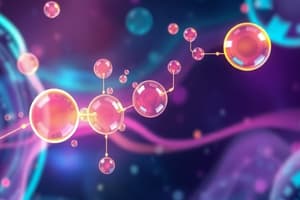Podcast
Questions and Answers
In aqueous solution, how is HNO3 classified?
In aqueous solution, how is HNO3 classified?
- Strong Acid (correct)
- Strong Base
- Weak Base
- Weak Acid
In aqueous solution, how is HBr classified?
In aqueous solution, how is HBr classified?
- Weak Acid
- Strong Base
- Weak Base
- Strong Acid (correct)
In aqueous solution, how is H3PO4 classified?
In aqueous solution, how is H3PO4 classified?
- Weak Base
- Weak Acid (correct)
- Strong Acid
- Strong Base
In aqueous solution, how is CH3COOH classified?
In aqueous solution, how is CH3COOH classified?
In aqueous solution, how is HCN classified?
In aqueous solution, how is HCN classified?
In aqueous solution, how is LiOH classified?
In aqueous solution, how is LiOH classified?
In aqueous solution, how is Ba(OH)2 classified?
In aqueous solution, how is Ba(OH)2 classified?
In aqueous solution, how is CH3NH2 classified?
In aqueous solution, how is CH3NH2 classified?
In aqueous solution, how is NH3 classified?
In aqueous solution, how is NH3 classified?
In aqueous solution, how is NaCl classified?
In aqueous solution, how is NaCl classified?
What is the conjugate acid of H2PO4-?
What is the conjugate acid of H2PO4-?
What is the conjugate acid of CO3 ^2-?
What is the conjugate acid of CO3 ^2-?
What is the conjugate of NH3?
What is the conjugate of NH3?
When K is small, what does it imply about the reaction?
When K is small, what does it imply about the reaction?
When K is large, what does it imply about the reaction?
When K is large, what does it imply about the reaction?
What happens when Q>K?
What happens when Q>K?
What does Q=K indicate?
What does Q=K indicate?
Flashcards are hidden until you start studying
Study Notes
Acids and Bases Classification
- HNO3: Classified as a strong acid, fully dissociates in aqueous solution.
- HBr: Another strong acid, also completely ionizes in water.
- H3PO4: Identified as a weak acid, partially dissociates in solution.
- CH3COOH (Acetic Acid): A weak acid, known for its partial dissociation in water.
- HCN: Considered a weak acid due to incomplete ionization.
Strong Bases
- LiOH: Recognized as a strong base, fully dissociates in solution.
- Ba(OH)2: Another strong base that completely ionizes in water.
Weak Bases
- CH3NH2 (Methylamine): Classed as a weak base, does not fully dissociate in solution.
- NH3 (Ammonia): A weak base, known for its partial dissociation and equilibrium establishment.
Other Classifications
- NaCl: Not classified as an acid or base; referred to as "other" due to its neutral nature in aqueous solution.
Conjugate Acids
- H2PO4- (Dihydrogen Phosphate): Conjugate acid is H3PO4 (Phosphoric Acid).
- CO3^2- (Carbonate): Conjugate acid is HCO3- (Bicarbonate).
- NH3 (Ammonia): Conjugate acid is NH4+ (Ammonium Ion).
Reaction Quotient (Q) and Equilibrium
- When K is small: Indicates a reaction that favors reactants over products.
- When K is large: Suggests a reaction favoring the formation of products over reactants.
- Q > K: Signifies that the reaction will shift towards the reactants, decreasing product concentration.
- Q = K: Denotes that the system is at equilibrium and will not shift toward either reactants or products.
Studying That Suits You
Use AI to generate personalized quizzes and flashcards to suit your learning preferences.




